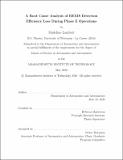A root cause analysis of REXIS detection efficiency loss during phase E operations
Author(s)
Lambert, Madeline(Madeline Marie)
Download1191820963-MIT.pdf (27.23Mb)
Other Contributors
Massachusetts Institute of Technology. Department of Aeronautics and Astronautics.
Advisor
Rebecca Masterson.
Terms of use
Metadata
Show full item recordAbstract
The Regolith X-ray Imaging Spectrometer (REXIS) is a student-built instrument flown on NASA's Origins, Spectral Interpretation, Resource Identification, Safety, Regolith Explorer (OSIRIS-REx) mission. During main science operations, the instrument experienced detector efficiency loss in the form of loss of iron calibration source counts, which greatly affected the science output. In this thesis, a root cause investigation is performed on the loss of iron counts, and an optical light leak onto the edge of the instrument's detectors is identified as the most likely cause. A CAST analysis is then performed to identify possible organizational and cultural causes of the design that allowed for an optical light leak, and recommendations for future similar instruments (low-cost, high-risk) are made.
Description
Thesis: S.M., Massachusetts Institute of Technology, Department of Aeronautics and Astronautics, May, 2020 Cataloged from the official PDF of thesis. Includes bibliographical references (pages 203-205).
Date issued
2020Department
Massachusetts Institute of Technology. Department of Aeronautics and AstronauticsPublisher
Massachusetts Institute of Technology
Keywords
Aeronautics and Astronautics.